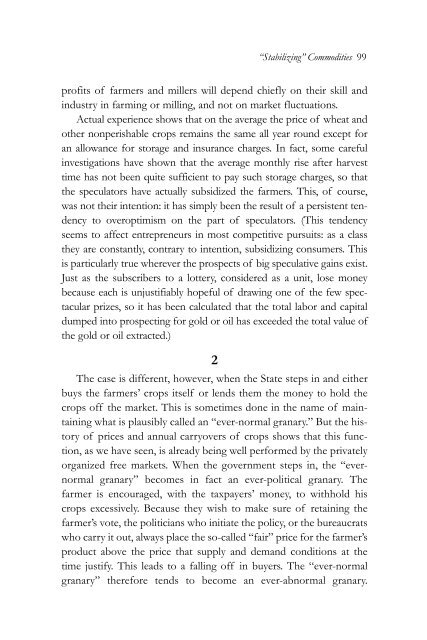1gDdM7w
1gDdM7w
1gDdM7w
- No tags were found...
You also want an ePaper? Increase the reach of your titles
YUMPU automatically turns print PDFs into web optimized ePapers that Google loves.
“Stabilizing” Commodities 99profits of farmers and millers will depend chiefly on their skill andindustry in farming or milling, and not on market fluctuations.Actual experience shows that on the average the price of wheat andother nonperishable crops remains the same all year round except foran allowance for storage and insurance charges. In fact, some carefulinvestigations have shown that the average monthly rise after harvesttime has not been quite sufficient to pay such storage charges, so thatthe speculators have actually subsidized the farmers. This, of course,was not their intention: it has simply been the result of a persistent tendencyto overoptimism on the part of speculators. (This tendencyseems to affect entrepreneurs in most competitive pursuits: as a classthey are constantly, contrary to intention, subsidizing consumers. Thisis particularly true wherever the prospects of big speculative gains exist.Just as the subscribers to a lottery, considered as a unit, lose moneybecause each is unjustifiably hopeful of drawing one of the few spectacularprizes, so it has been calculated that the total labor and capitaldumped into prospecting for gold or oil has exceeded the total value ofthe gold or oil extracted.)2The case is different, however, when the State steps in and eitherbuys the farmers’ crops itself or lends them the money to hold thecrops off the market. This is sometimes done in the name of maintainingwhat is plausibly called an “ever-normal granary.” But the historyof prices and annual carryovers of crops shows that this function,as we have seen, is already being well performed by the privatelyorganized free markets. When the government steps in, the “evernormalgranary” becomes in fact an ever-political granary. Thefarmer is encouraged, with the taxpayers’ money, to withhold hiscrops excessively. Because they wish to make sure of retaining thefarmer’s vote, the politicians who initiate the policy, or the bureaucratswho carry it out, always place the so-called “fair” price for the farmer’sproduct above the price that supply and demand conditions at thetime justify. This leads to a falling off in buyers. The “ever-normalgranary” therefore tends to become an ever-abnormal granary.


